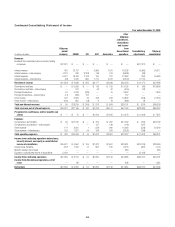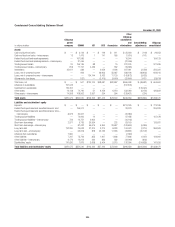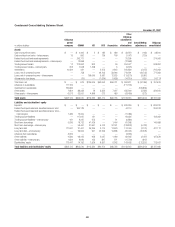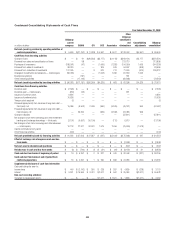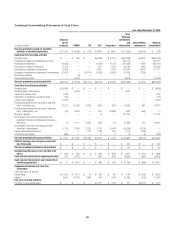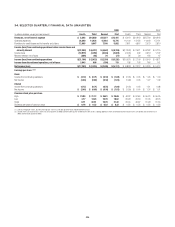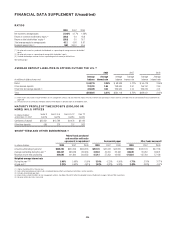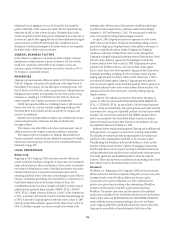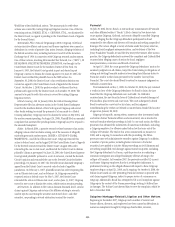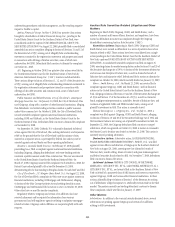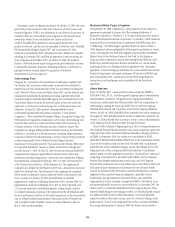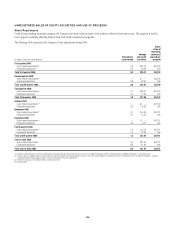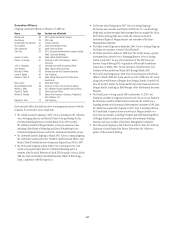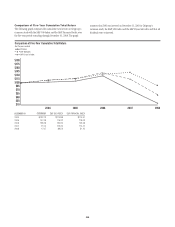Citibank 2008 Annual Report Download - page 234
Download and view the complete annual report
Please find page 234 of the 2008 Citibank annual report below. You can navigate through the pages in the report by either clicking on the pages listed below, or by using the keyword search tool below to find specific information within the annual report.The FRB may also expect the Company to commit resources to its
subsidiary banks in certain circumstances. However, the FRB may not
compel a bank holding company to remove capital from its regulated
securities and insurance subsidiaries for this purpose.
A U.S. bank is not required to repay a deposit at a branch outside the U.S.
if the branch cannot repay the deposit due to an act of war, civil strife, or
action taken by the government in the host country.
Privacy and Data Security
Under U.S. federal law, the Company must disclose its privacy policy to
consumers, permit consumers to “opt out” of having non-public customer
information disclosed to third parties, and allow customers to opt out of
receiving marketing solicitations based on information about the customer
received from another subsidiary. States may adopt more extensive privacy
protections.
The Company is similarly required to have an information security
program to safeguard the confidentiality and security of customer
information and to ensure its proper disposal and to notify customers of
unauthorized disclosure, consistent with applicable law or regulation.
Non-U.S. Regulation
A substantial portion of the Company’s revenues is derived from its
operations outside the U.S., which are subject to the local laws and
regulations of the host country. Those requirements affect how the local
activities are organized and the manner in which they are conducted. The
Company’s foreign activities are thus subject to both U.S. and foreign legal
and regulatory requirements and supervision, including U.S. laws
prohibiting companies from doing business in certain countries.
SECURITIES REGULATION
Certain of Citigroup’s subsidiaries are subject to various securities and
commodities regulations and capital adequacy requirements of the
regulatory and exchange authorities of the jurisdictions in which they
operate.
Subsidiaries’ registrations include as broker-dealer and investment
adviser with the SEC and as futures commission merchant and commodity
pool operator with the Commodity Futures Trading Commission (CFTC).
Subsidiaries’ memberships include the New York Stock Exchange, Inc.
(NYSE) and other principal United States securities exchanges, as well as the
Financial Industry Regulatory Authority (FINRA) and the National Futures
Association (NFA).
Citigroup’s primary U.S. broker-dealer subsidiary, Citigroup Global
Markets Inc. (CGMI), is registered as a broker-dealer in all 50 states, the
District of Columbia, Puerto Rico, Taiwan and Guam. CGMI is also a
primary dealer in U.S. Treasury securities and a member of the principal
United States futures exchanges. CGMI is subject to extensive regulation,
including minimum capital requirements, which are issued and enforced by,
among others, the SEC, the CFTC, the NFA, FINRA, the NYSE, various other
self-regulatory organizations of which CGMI is a member and the securities
administrators of the 50 states, the District of Columbia, Puerto Rico and
Guam. The SEC and the CFTC also require certain registered broker-dealers
(including CGMI) to maintain records concerning certain financial and
securities activities of affiliated companies that may be material to the
broker-dealer, and to file certain financial and other information regarding
such affiliated companies.
Citigroup’s securities operations abroad are conducted through various
subsidiaries and affiliates, principally Citigroup Global Markets Limited in
London and Nikko Citigroup Limited (a joint venture between CGMHI and
Nikko Cordial) and Nikko Cordial in Tokyo. Its securities activities in the
United Kingdom, which include investment banking, trading, and brokerage
services, are subject to the Financial Services and Markets Act of 2000, which
regulates organizations that conduct investment businesses in the United
Kingdom including capital and liquidity requirements, and to the rules of
the Financial Services Authority. Nikko Citigroup Limited and Nikko Cordial
are registered securities companies in Japan, and as such their activities in
Japan are regulated principally by the Financial Services Agency of Japan.
These and other subsidiaries of Citigroup are also members of various
securities and commodities exchanges and are subject to the rules and
regulations of those exchanges. Citigroup’s other offices abroad are also
subject to the jurisdiction of foreign financial services regulatory authorities.
CGMI is a member of the Securities Investor Protection Corporation
(SIPC), which, in the event of the liquidation of a broker-dealer, provides
protection for customers’ securities accounts held by the firm of up to
$500,000 for each eligible customer, subject to a limitation of $100,000 for
claims for cash balances. To supplement the SIPC coverage, CGMI has
purchased for the benefit of its customers additional protection, subject to an
aggregate loss limit of $600 million and a per client cash loss limit of up to
$1.9 million.
Unresolved SEC Staff Comments
The Company is in discussion with the SEC in response to comment letters
received from the SEC Division of Corporate Finance primarily regarding
Goodwill.
CAPITAL REQUIREMENTS
As a registered broker-dealer, CGMI is subject to the SEC’s Net Capital Rule.
CGMI computes net capital under the alternative method of the Net Capital
Rule, which requires the maintenance of minimum net capital equal to 2%
of aggregate debit items (as defined). A member of the NYSE may be required
to reduce its business if its net capital is less than 4% of aggregate debit
balances (as defined) and may also be prohibited from expanding its
business or paying cash dividends if resulting net capital would be less than
5% of aggregate debit balances. Furthermore, the Net Capital Rule does not
permit withdrawal of equity or subordinated capital if the resulting net
capital would be less than 5% of such aggregate debit balances.
The Net Capital Rule also limits the ability of broker-dealers to transfer
large amounts of capital to parent companies and other affiliates. Under the
Net Capital Rule, equity capital cannot be withdrawn from a broker-dealer
without the prior approval of that broker-dealer’s designated examining
authority (in the case of CGMI, the NYSE) in certain circumstances,
including when net capital after the withdrawal would be less than (i) 120%
of the minimum net capital required by the Net Capital Rule, or (ii) 25% of
the broker-dealer’s securities position “haircuts.” “Haircuts” is the term used
for deductions from capital of certain specified percentages of the market
value of securities to reflect the possibility of a market decline prior to
disposition. In addition, the Net Capital Rule requires broker-dealers to notify
the SEC and the appropriate self-regulatory organization two business days
before any withdrawals of excess net capital if the withdrawals (in the
aggregate over any 30-day period) would exceed the greater of $500,000 or
30% of the broker-dealer’s excess net capital, and two business days after any
228



